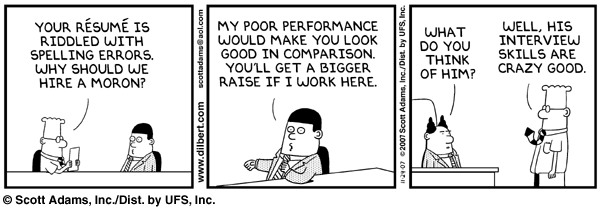If: You’re applying online and not getting responses
Then: Spend a few weeks participating in networking events instead
Meetups are a great place to become acquainted with colleagues and companies in the industry of your choice, and they offer a low-risk, low-pressure environment to seed new relationships. The events are often held monthly or even weekly, so you’ll likely see and get to know the same people if you become a regular attendee. It’s no secret that people do business with other people they know and like.
Hackathons are another way to meet employed developers in the industry, showcase your skills, and bolster your resume. Unlike career fairs, hackathons provide more opportunity to mingle, plus a chance to prove your skill set. Spending a weekend building a project with your new colleagues will give you the opportunity to learn from employed developers, while having fun and fortifying your resume. Hackathons will help you position yourself as a recommendable member of a team, and an involved participant in your preferred industry.
Also, keep in mind that the job you want may not be advertised online, and networking is a useful exercise in researching people, companies, and available (or upcoming) job listings.
If: You’re not getting called back for interviews
Then: Use your network to get a second and third opinion on your application, resume, and cover letters
It’s important to make every cover letter and application you submit as original, concise, and tailored as possible, and to carefully consider the specific responsibilities you’re applying for. According to staffing agency Robert Half, for your cover letter to be effective, you should adhere to the following format:
- Explain the specifics of why you want the job
- Describe how your skills and experience make you an ideal fit
- Explain the traits you possess that are useful for the role, and which are not mentioned on your resume
- Establish your personal connection with the company you’re applying to
- Explain employment gaps, if applicable
After you’ve compiled a cover letter worthy of your dream job, ask someone with trustworthy grammar and spelling to read and offer suggestions on your application.
If: You’re getting interviews (but no offers)
Then: Ask a friend to mock interview you, and provide feedback
Mock interviews are practice interviews that simulate the conditions, questions, and environment of a professional interview in advance of the real thing. Knowing how to improve your interviewing style––from what to wear to how to shake hands and methodically answer questions––is essential for boosting your confidence and landing the job.

Mock interviews will also provide a chance to experiment with your interview answers. According to Wolfgang Career Coaching, the following three strategies will give you the maximum benefit from mock interviews:
-
Simulate the interviewing environment. It’s easy to answer questions in the comfort of your own home, so if you can, conduct the mock interview in a business setting you’ve never visited before.
-
Dress the part. Practicing interview questions is a good idea–so take a few extra minutes and get in your interview attire and print a resume. Every extra habitual effort you put into the mock interview will increase your advantage over other candidates and make the interview process that much easier.
-
Practice easy (and tough) questions. "Tell us about yourself” is the most common ice breaker question in an interview, and one that people can easily trip up on. Wolfgang Career Coaching advises a very specific structure to this answer: Start with a one-sentence summary of your career history. Then, based on the position you’re applying for, explain some accomplishments that will capture the interviewer’s attention and demonstrate your match for the position; to conclude, you can discuss the next step in your career. This next career move that you mention should be tailored to the position you are applying for.
By developing what you should say first, and then practicing your answer a few times, you will feel additionally confident and prepared.
If: You’re having a hard time finding job openings
Then: Try these online resources
Dice.com is a job board dedicated solely to careers in programming and information technology. Since 2003, icrunchdata has catered to job hunters in big data and analytics. The site has more than 346,000 job listings, covering roles such as IT systems engineer, data analyst, director of modeling, application development, and more.
A few others to check out: TechCareers, Indeed, Monster, and Simply Hired.
If: You lack experience
Then: Build a side project or volunteer your skills to those in need
Build a Minimum Viable Product (MVP), and enlist friends for fun and feedback. Consider asking leaders in your field for an informational interview and research the kind of side projects that would catch their eye, or if they’ve undertaken projects on their own in the past.
Volunteering for a non-profit or donating your skills to a community in need will develop your resume and bolster your network of professional contacts.
If you’re job searching in Seattle, attend a Code Fellows event to gather supportive materials for your job search and side project at the same time!

